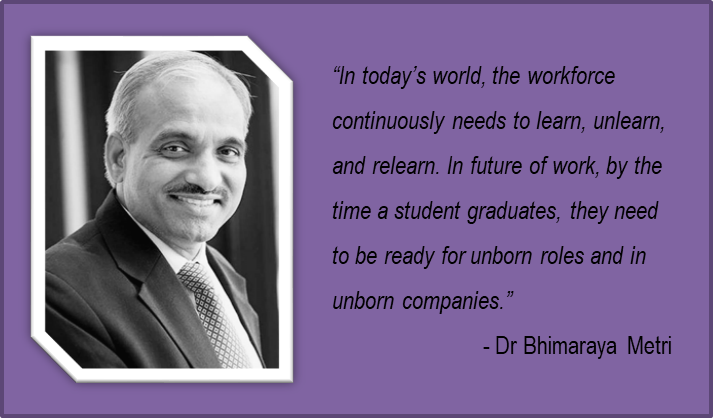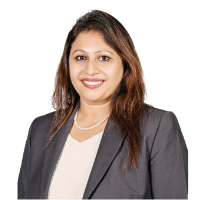Dr. Bhimaraya Metri is the Director of the Indian Institute of Management, Nagpur and also the Chairman – All India Board of Management Studies, AICTE, AIMA Board of Studies. Former Director IIM Trichy & L&T Institute of Project Management Vadorada, BITS Pilani. Also worked as principal Technical Agency(PTA) for The Pradhan Mantri Gram Sadak Yojana (PMGSY). In this interview, he shares insights with Sameera Fernandes on the New Education Policy and the importance of the New Education Policy and how it will be a giant leap for India.
You were instrumental in framing the New Education Policy. What was the experience like?
Outlining the vision of India’s new education system which replaces the earlier version in 1986, the NEP 2020 is a comprehensive framework which outlines India’s vision in driving a progressive culture and a growth mindset. NEP draft committee consulted several institutions /orgnaisations. Committee members also interacted 217 eminent persons like educationists, senior academicians from a cross-section of the Indian higher education system including Government bodies, policy makers, regulators, Chancellors and various stalwarts including Bharath Ratna CNR Rao, AICTE Chairman Anil Sahasrabudhe. It was great experience interacting with draft committee members about roadmap for NEP 2020.
The Institute of Eminence will make India a global education hub. How important are the IoE’s in building this reputation?
Institutes of Eminence (IoE) is a recognition scheme for higher education institutes in India, set by the University Grants Commission in 2017. The plan encompasses twenty institutions, 18 of which have already been declared Institutes of Eminence as of March 2021. Recognised institutes are granted more autonomy, both administratively (e.g. setting fees) and academically, are allowed to open offshore campuses, and will enjoy better collaboration opportunities with global universities. Public institutions are granted up to 1,000 crore; private institutions under IoE fund for themselves. As a member of IoE Mentoring Committee, my experience has been extremely positive interacting and visiting some of the IoEs. I am sure IoEs will make a mark to build India as a global education hub.
Keeping in mind the current pandemic, would you be able to guide us on the future outlook and how it will affect the Indian scenario on various fronts?
Today the future is FLUID. ‘F’ stands for future which is fluid. ‘L’ stands for leadership is also fluid as the context is continuously changing. The ‘U’ which resonates an Uncertain context because of speed of technology disruptions. The moment context changes, leadership style changes. The ‘I’ stands for Intellectual Capital. Tomorrow’s work and workplace demands liquid workforce. and ‘D’ which stands for digital strategy which is also fluid. Gone are the days for long term strategy, future of work only demands emergent or fluid strategy. In this FLUID world, liquid workforce continuously need to learn unlearn, and relearn. Skilling –upskilling and reskilling are the ways for life long learning. In future of work, by the time a student graduates, they need to be ready for unborn roles and in unborn companies.
Times are changing and Institutions have a greater role to play. The very place meant to gain knowledge is now a platform to build competency. Although skilling will remain as the core foundation, students will now need to be prepared for mindset development. Capability building is another aspect.
What is the role of Partnerships & Collaborations in ensuring a progressive education system?
We need to join forces with the top notch universities, business schools or higher educational institutions across the world, alongside industry to ensure a seamless set up is in place. Today, in this networking world, partnerships and collaborations will ensure a win-win to help build a sustainable future as per the Sustainable Development Goals of the United Nations. This area is critical to help the four dimensions to sustainable development – society, environment, culture and economy – which are intertwined, not separate. Sustainability is a paradigm for thinking about the future in which environmental, societal and economic considerations are balanced in the pursuit of an improved quality of life.
As per your experience, its time for us to rethink the future of work. Will it be project or phenomena based?
With the current pedagogy, teaching in isolation is not going to work. Mindset developments are project or phenomena based. Just as in any merger and acquisition one needs to draw resources from HR, Legal and other areas in a company, along with the ERP system, institutions need to jointly mentor and work together to promote growth-based learning. Take for example a project where students need to come together from different parts of the world to handle a global virtual project. Each student is guided by the respective Institution professors to work together from several continents. Even though their working time zone are different, the manner in which they coordinate, have a cross cultural understanding and how they work in such an environment will help learn develop a progressive mindset. These are some of the elements required for the future workforce as once they graduate – they will come to know learning pedagogies like these.
The views and opinions published here belong to the interviewer and the interviewee and do not necessarily reflect the views and opinions of the publisher.



Be the first to comment on "Straight Talk with Dr Bhimaraya Metri"